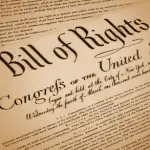
By December 1791 a series of ten amendments to the Constitution had been drafted, debated and accepted by the states. In plain language, the ten clauses of the US Bill of Rights are:
First Amendment. Freedom of religion; freedom of speech; freedom of the press; the right of citizens to peacefully assemble; the right to petition the government with grievances.
Second Amendment: The right of citizens to keep and bear arms (weapons).
Third Amendment: The right of citizens not to be forced to house soldiers in their homes during peacetime, or in wartime without appropriate legislation.
Fourth Amendment: The right of citizens to be secure from unreasonable searches; and that search warrants only be conducted with ‘probable cause’ and specific instructions for people or items to be seized.
Fifth Amendment: The right of citizens to trial by jury for serious crimes; the right not to be tried twice for the same crime (double jeopardy); the right of a person to not testify if it might incriminate them (‘pleading the Fifth’); the right not be detained or denied of freedom or property without due process; and a protection against private property being acquired for public use without just compensation.
Sixth Amendment: The right of accused persons to a speedy and public trial by an impartial jury; to hear prosecution witnesses and present witnesses for their defence; and to have the assistance of legal counsel for their defence.
Seventh Amendment: The right to a jury trial in certain civil cases.
Eight Amendment: The protection of individuals accused of a crime from excessive bail, excessive fines and cruel and unusual punishments.
Ninth Amendment: A clause specifying that if certain other rights are not expressed in the Constitution, this should not be interpreted to mean that they are not enjoyed by the people.
Tenth Amendment: Powers not specifically given to the United States by the Constitution, or specifically denied to the States, belong to the States or to the people.
Subsequent amendments to the US Constitution also play a role in protecting rights. The Fourteenth Amendment (passed in 1868) states that “the right of citizens of the United States to vote shall not be denied or abridged by the United States or by any State on account of race, colour, or previous condition of servitude.” The Fifteenth Amendment (passed 1870) prohibits the denial of a citizen of the right to vote based on that citizen’s “race, colour or previous condition of servitude”. And the Nineteenth Amendment (passed 1920) protects the voting rights of women by declaring that “…the right of citizens of the United States to vote shall not be denied or abridged by the United States or by any State on account of sex.” These rights have been added to the US Constitution over time, as African-Americans and women have fought for – and won – their respective rights.
Upholding the rights expressed in the Constitution is the role of the Supreme Court. The Supreme Court constitutes the judicial branch of the United States government and contains nine justices, appointed for life by the President. The Supreme Court interprets the Constitution, determines whether legislation and executive orders are constitutionally valid, and acts as the highest court of appeal. In these respects it is similar to our own High Court – however, because the US Constitution contains a Bill of Rights, the US Supreme Court hears more rights-based cases. There have been many Supreme Court rulings that protect individual rights, such as Roe v. Wade (1973) which protected a woman’s right to terminate her pregnancy before a certain point, and Lawrence v. Texas (2003) which overturned a State law criminalising homosexual activity.
The United States also protects the rights of its citizens through Federal and State legislation and the courts. The Civil Rights Act (US, 1964) was instrumental in allowing African-Americans voting equality with whites. The Americans with Disabilities Act (US, 1990) forbids discrimination against persons based on any disability they may have. Many US States have passed laws protecting the rights of gays and lesbians, such as the Wisconsin Non-Discrimination Law (2007). A few States have extended their rights by recognising same-sex marriage, though this is controversial and in dispute.
© lawgovpol.com 2014. Content on this page may not be republished or distributed without permission. For more information please refer to our Terms of Use.
